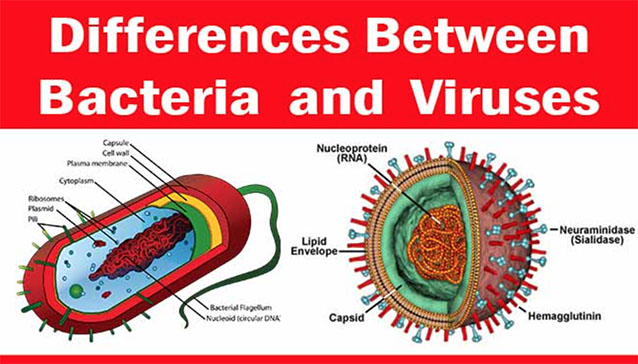1041 Bacterium vs Virus
‘Deeply worrying’: 92% of Australians don’t know
the difference between viral and bacterial infections
OK, are you one of them? Well, I was.

Differences between bacterial and viral infection
Bacteria are independent living cells that enter the body and may cause illnesses such as whooping cough, pneumonia, sinusitis and ear infections (upper respiratory infections, URIs); they can be treated by antibiotics that attack and kill them. The important issue with bacterial infections is that the medication attacks the independent bacterium, but not the body’s cells.
A bacterium is a single, but complex, cell. It can survive on its own, inside or outside the body. Most bacteria aren’t harmful. In fact, we have many bacteria on and inside our body, especially in the gut to help digest food.
Viruses are smaller and are not cells. Unlike bacteria, they need a host such as a human or animal to multiply. Viruses cause infections by entering and multiplying inside the host’s healthy cells. Viral infections include the common cold, flu, most coughs and bronchitis, chickenpox and HIV/AIDS.
But - importantly - viruses cannot be treated with antibiotics. A Virus is an infective agent, not a cell and when it enters the body it needs a host cell to replicate and multiply. In the process of doing so it destroys the host cell, then its replicants invade other cells ... as a result the body gets very sick and may die. Due to the fact that the virus has become a part of the host cell, it is very difficult to develop medications that treat a virus, because the medicine may well kill the host cell.
Why are there so many drugs to kill bacteria,
but so few to tackle viruses?
Influenza is a viral infections and features many of the same symptoms as URIs, in addition to body aches and a more severe fever. However, influenza, as opposed to most URIs, can be treated using antiviral medicines, as long as the virus was detected within the first 48 hours. Depending on the age of the patient, one or two flu vaccines during a given year can help them remain flu-free.
But apparently that is not the case with the Corona Virus, which causes CoViD-19 (the Corona Virus Disease, originating in 2019) and that is the reason why it is paramount to find a vaccine against CoVi. With a virus infection we may be left with just managing the symptoms ... until the immune system fights the virus off.
So, is it important to know the difference between bacteria and viruses? It’s hugely important, because bacteria are killed by antibiotics, viruses are not ... there are many meds that kill bacterial infections, but very few that kill viruses.
So if you’ve got a viral infection, like the flu, it’s no use taking antibiotics … however, the point is that too many people take too many antibiotics and the population is building up resistance to them, making them useless.
Parents, it’s worth mentioning that when it comes to URIs, children suffer from URI symptoms longer and develop URIs more frequently than adults. These symptoms may last anywhere from 10 to 14 days, so be sure to keep an eye out for improvement during that timeframe.